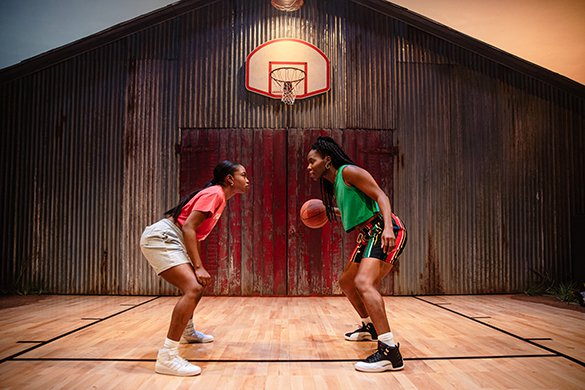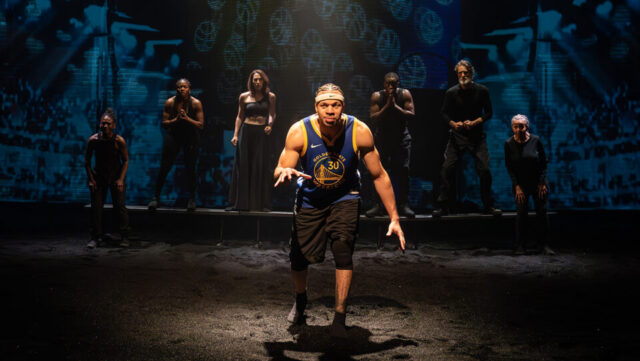
Starra Jones (Erica Matthews) and Sidney Brown (Tamera Tomakili) face off against each other in Candrice Jones’s Flex (photo by Marc J. Franklin)
FLEX
Lincoln Center Theater at the Mitzi E. Newhouse
150 West 65th St. between Broadway & Amsterdam Ave.
Through August 20
www.lct.org/shows/flex
“Being a fan is like having a religion,” Matt says in Rajiv Joseph’s King James, a play that ran this spring at MTC at New York City Center about two Cleveland men who bond over their mutual love of hoops star LeBron James, perhaps the greatest player of all time.
Here in New York, basketball itself is a religion. Fans continue to worship the Knicks and pack Madison Square Garden even though the team has won only one playoff series in ten years and has not taken home a championship in half a century; the city went into mourning when former All-Star MVP center Willis Reed died this past March at the age of eighty. Across the East River, the Nets have been in turmoil since they moved to Brooklyn in 2012, going through superstars at the Barclays Center like Halloween candy, with nothing to show for it.
Meanwhile, for those paying attention, the other team at Barclays, the New York Liberty, is having its best season since the Women’s National Basketball Association started in 1997, in serious contention for its first league title.
Basketball lies at the heart of two current dramas in Manhattan, one worthy of a championship, the other, well, in need of significant rebuilding; both conclude their seasons on August 20.
At Lincoln Center’s Mitzi E. Newhouse, Candrice Jones’s Flex is a fast-paced and exciting play set in rural Arkansas in 1998, where five seventeen-year-old Black women on the team known as the Lady Train are preparing for their next big game. Shooting guard Sidney Brown (Tamera Tomakili) is being scouted by major colleges. Point guard Starra Jones (Erica Matthews) is a ball hog jealous of the attention Sidney is getting. Power forward Cherise Howard (Ciara Monique) believes they all need to be cleansed and offers to baptize everyone. Center Donna Cunningham (Renita Lewis) is the most grounded and caring of the tight-knit group. And shooting guard April Jenkins (Brittany Bellizeare) is pregnant but wants to keep playing, despite the strong objections of coach Francine Pace (Christiana Clark).
Matt Saunders’s primary set consists of half a court, with the rim affixed on the top of a barn garage. The floor is actually parquet but we’re told it’s dirt. At the beginning, all five players appear to be with child, but following practice, four of them take out fake pregnant belly prosthetics. It’s a funny moment that instantly shows their camaraderie and support for one another.
The narrative is divided into four quarters, just like a basketball game. The cast displays its skills right from the opening tip-off, getting into a rhythm. “My first buzzer beater ever! / I finally know I’m just as good as you! / No more Plainnole, Arkansas, dirt courts for me, Mama! / No more dust in my eyes, my ankles, my fingernails. / I’m gonna win regionals, then state,” Starra says to her late mother, who gave up bball for the army. “Ain’t no way you gonna believe this. / But, scouts are coming here, to Plainnole. / You said by the time I got older. / There’d be a girls’ NBA. / You were right. / I’m going to the WNBA.”
Starra’s selfishness leads to major problems when the teammates hang out one night at Sidney’s house, discussing Michael Jordan, sexual abuse, abortion, condoms, and boxers vs. briefs. Soon they’re in an ingeniously designed car, singing Aaliyah’s “Are You That Somebody,” each of them highlighting individual lines that are particularly meaningful, which include “I’ve been holdin’ back this secret from you / I probably shouldn’t tell it, but / But if I, if I let you know / You can’t tell nobody, I’m talkin’ ’bout nobody.” Secrets keep coming out — or teeter around the rim — as the state tournament approaches and the game plan might involve benching several starting players.
Tony-nominated director Lileana Blain-Cruz (Fefu and Her Friends, Anatomy of a Suicide) guides the action like a masterful basketball coach, smoothly transitioning between offense and defense, knowing exactly who should have the ball at any given moment. The play is in constant motion, leaving no time for slacking. In a brilliant move, the stage crew dress like referees, adding humor and referencing how the players are too often being judged.
While it’s about a lot more than just basketball, Jones doesn’t overplay the metaphors, keeping her eyes on the rock as the action heats up. Mika Eubanks’s costumes range from sweats, shorts, and T-shirts to snazzy uniforms, with Adam Honoré’s lighting and Palmer Hefferan’s sound contributing to the overall tension.
The title refers specifically to a play run by the five players on the court, but it also evokes the Brooklyn street dance known as flexing, a word used for boasting or expressing oneself, and the standard dictionary meaning, to bend, intimating that the teammates have to be flexible if they want to succeed.
The cast, which also features Eboni Edwards as the sixth member of the Lady Train, comes together like a successful team with a legitimate shot at the crown. They face serious issues at school and at home, with boyfriends, girlfriends, and relatives, and with race and religion, but the more they work together, the more their goals are within reach, but it’s going to take more than a buzzer-beating three-pointer for them to win in the game of life.

Demi (Mister Fitzgerald) leads his team on the Battle Field in Inua Ellams’s The Half-God of Rainfall (photo by Joan Marcus)
THE HALF-GOD OF RAINFALL
New York Theatre Workshop
79 East Fourth St. between Second & Third Aves.
Through August 20
www.nytw.org
Over at New York Theatre Workshop, Inua Ellams’s The Half-God of Rainfall features seven characters on a floor of dirt and mulch, constructed around the game of basketball while being about much more, although precisely what gets garbled like a stalled offense and a defense with too many holes.
The ninety-minute play, a melding of Greek and Yoruba mythology told as an epic poem in chapters, opens with the fine cast introducing themselves, a dose of reality that immediately blurs the fantasy that follows. At the center is Demi (Mister Fitzgerald), a demigod born to Zeus (Michael Laurence) and the mortal Modúpé (Jennifer Mogbock). Observing the proceedings are the River Goddess Osún (Patrice Johnson Chevannes), Sàngó, an Orisha God of Thunder (Jason Bowen), Hera, the Goddess of Marriage, Women, and Family (Kelley Curran), the Orisha Gods Òrúnmilà and Elégba (Lizan Mitchell), and other mythical figures. Because his father is Zeus, the young Demi, called the Town Crier because of his propensity to rain down tears, is banned from playing basketball, which in this world represents war.
Mortals play on a makeshift court known as the Battle Field — “where generals were honored and mere soldiers crushed” — built with telephone poles, tires, fishing nets, and charcoal. “Basketball was more than sport; the boys were obsessed,” Elégba says. “They played with a righteous thirst,” Hera adds. Sàngó: “There were parries, thrusts . . .” Elégba: “shields and shots . . .” Zeus: “strategies and tactics . . .” Osún: “land won and lost . . .” Modúpé: “duels fought . . .” Hera: “ball like a missile . . .” Zeus: “targets locked.”
When Demi surprisingly reveals a remarkable shooting acumen, everyone begins to view him differently. But Demi’s prowess leads to both an NBA contract as well as disagreements among the Gods and a war that takes place with weapons, not a round ball.
Similarly to the young women in Flex, the young men in Rainfall engage in trash-talking and worship Michael Jordan; among the same issues that are brought up are sexual assault, prayer, and competition that extends beyond the court. Whereas the women see basketball as a way to improve their lot in life and form a close group, in Rainfall “Hera rolled her eyes at how mortal Gods could be, how like men to reduce disputes down to sporting feats, but it was done: the stakes, awful, the route to run.”
Characters in Rainfall shift between dialogue and narration, often in the same speech, so it can become confusing whether they’re talking to the audience or the other Gods and mortals. Too much of the action is described instead of playing out on the court, turning the show into a kind of staged reading. Riccardo Hernández’s set contains scrims on three sides where Tal Yarden projects abstract and concrete images that only add to the perplexity. Linda Cho’s costumes and the props at times feel more like cosplay than serious theater.
The thirty-eight-year-old Ellams, who was born in Nigeria and raised there and in England and Ireland, has been playing basketball since he was twelve; he is also a Marvel Comics enthusiast and has written books and performed solo shows. He stuffs too much into The Half-God of Rainfall, which also has problems with its timeline as it ventures between the ancient and the present, particularly when Sàngó mentions which other real-life all-stars are demigods. (How many people in the audience are likely to know who Clyde Drexler is?)
From start to finish, Flex shows that it’s got game, effectively executing its strategy with an expert balance of humor and sincerity as it sets its sights on its championship goals. The Half-God of Rainfall is all over the place, in desperate need of a tactical blueprint if it wants to have a shot at possibly making the playoffs.
[Mark Rifkin is a Brooklyn-born, Manhattan-based writer and editor; you can follow him on Substack here.]